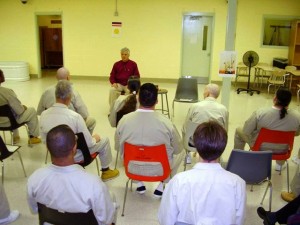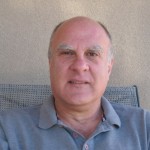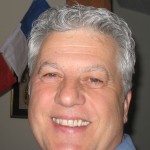Thursday
Community ArticlesThe Crystal Ball Within: Volunteering at a Prison Meditation Program
We are all potential criminals, and those whom we have put into prison are no worse,
deep down, than any one of us. They have succumbed to ignorance, desire and anger,
ailments that we all suffer from but to different degrees. Our duty is to help them.
– His Holiness, The Dalai Lama
Does anyone know the exact reference for this quote? It stirs me to practice, particularly here at the Adult Correctional Institutions of Rhode Island, where I, and a small group of volunteers*, provide a weekly meditation class for male inmates housed in a medium security facility. The quote touches me deeply with both joy and pain, for I was incarcerated once in South America, and perhaps that is what generates this strong connection to these khaki-clad practitioners. Our meditation class is now in its third year, and I often think of how lucky I am to practice with this group. They inspire me with their diligence and faithfulness, the likes of which I have never experienced sitting at other Shambhala centers across the United States.
As a sociologist, I am aware of the news headlines from around the globe in which the U.S. now leads the world in the incarceration of its citizens. We incarcerate more than other places with well known human rights abuses such as China and Russia. Therefore, the timeliness of contemplative prison work, such as our program in Rhode Island and many others here and abroad, could not be more vital.
Stunning the free world, the Pew Center Public Safety Performance Project (2007) reported that the U.S. now incarcerates 1 out of every 100 adults. This statistic astounds me. Just who are these people? Well, they are our neighbors, the folks we went to high school with, family members, co-workers and people down the street. I have come to experience this group of about 20 dedicated practitioners as clear reflections of us all – and perhaps a bit better, too. Unlike the rest of us who are capable of making myriad excuses why we don’t or can’t practice (maybe I should just speak for myself here), these men commit to a weekly meditation class in one of the most difficult environments possible. Week after week they come to class, often bringing in someone new, ready to practice with tender and engaging hearts.
For them, everything about prison life is difficult. Status is gained by constant “one-upmanship”, such as who jostles whom in the chow line; they experience assaults, rape, benign neglect and pressure to join gangs for protection. In an environment so disparaging and stripped of grace, these men practice. Amidst clanging doors, strip searches and room tosses, blaring intercoms and the general difficulties of perpetual confinement in a shared cell smaller than most utility sheds, many say they maintain a daily practice. The art of being human is the lesson I learn from them. I have come to realize that they are my crystal ball, invoking in me the awareness of vast mind, and the bounty of my confusion and clutter. With their seamless attendance and dedication to daily study, they mirror for me how workable and sacred all my “junk” is. It would be easy to succumb to endless card games or TV watching in their modules, yet they come to class and want to learn the dharma. How they open and connect to sacred world in this environment is nothing short of inspirational.
Our weekly class consists of two 20 minute periods of combined sitting and walking meditation, shamatha yoga and book discussion, generally closing with 20 minutes of qi gong exercises. Through sangha donations, inmates have their own books: Turning The Mind Into An Ally and Ruling Your World, by Sakyong Mipham Rinpoche. They enjoy reading them and generate lively discussions.**
One day, a correctional officer (with whom I did not have any prior contact) came up to me at the facility and said, “You run that meditation program, right?” I said that I did and waited for a retort of some kind. Instead he said, “I want to thank you for making my job easier.” I stared at him in disbelief. “Really,” he said. “What you do makes my job easier because I see that the class has a calming effect on the inmates, who in turn, have a calming effect on other inmates.” Pebbles dropped in a pond – such ordinary magic! And not too many months later, on two different occasions, other correctional officers asked me when they would get their own meditation class. When I tell the inmates these stories, I try to impress upon them that it is they who are creating sacred world. I say to them, “You guys are doing it! Right here!”
Finally, in writing this article I hope to have piqued some curiosity about what goes on behind prison walls in general, and in particular, to provide some insight into what it’s like to volunteer for a program like this which deconstructs the notion that criminals are different from us – that somehow they deserve to be there because they are “bad”. Volunteering with prison communities is a practice of warriorship of which we are all capable. After passing through several barbed wire gates, prison check points and seven electronically-controlled, heavy metal doors to arrive at the education wing for class, I generally start with a comment like, “Oh, I so need to be here!” And we laugh together and take our seats.
* Other community volunteers are Penny Burke, Richard Sylvester, and David Margolis. The first prison Level 1 was taught by Richard Sylvester in January 2008. The second Level 1 was recently taught by Gail Flynn in January 2009. We hope to offer more levels in the future, particularly as class attendance grows.
** As of last year we are able to grant “good time” awards for participation. Each inmate receives two days off their sentence for every 4 classes attended. This program is one of the few non-court mandated programs they can attend that directly reduces their sentence. We are able to offer this because the program is secular and open to all faiths and backgrounds.
And now, some words from the inmates, former and present, and other volunteers:
A Rising Son
As I gather my thoughts about how powerfully affected I was by my attendance at an all day Shambhala Level 1 meditation program, the words “enormously peaceful” immediately come to my mind. When this event was held in January of 2008, I was in my fourteenth year of incarceration. My world had been filled with so many noises, both outside of my being and also deep within my mind and spirit.
Because I had participated in the weekly meditation program that was being offered, I was able to gather my mind into a peaceful, tranquil existence. This weekly practice, which occurred for about 8 months prior to the intensive all day program, proved to be such an important tool in my ability to fully benefit from the lengthy meditation that the group undertook on that cold day in January 2008.
On that day, I sat peacefully with myself for the longest time in my 51 years of life. I learned that I am okay and that the world will move about as fast as it usually does, but I don’t have to participate in the mad rush. I learned that being gathered deep within myself will bring me more peace, more joy, more happiness than I have ever experienced through all the capital investments, purchases and places that I have traveled in my world before that January day. I learned that being with myself is the most important thing I can do for myself, for this has provided me with confidence, patience, compassion, empathy and a much deeper understanding of myself and of others as we coexist on this planet.
I experienced hours of quiet solitude among the daily chaos of prison life. I was allowed out of my cell and out of my block for ten straight hours, and that was the longest time away from the sights, sounds and smells of confinement that I had experienced in almost a decade and a half. I believe that you do not have to be incarcerated to be confined, for you just have to feel restricted in any way; and yes, life does have appropriate restrictions in place, but you can search deep within yourself to not allow these restrictions to confine the emotional state of your being. Understanding and acceptance of these restrictions is necessary, along with the knowledge that there is only so much you can directly control. The ability to feel your breath, to clear your mind, to sit in peace among the chaos all developed within me as a result of my participation in this program.
Today, as I have enjoyed the first five months of freedom, I am a new man, a man who sits with himself daily, who understands and appreciates the total beauty of life and who has found freedom both in my external world, but more importantly, deep within my internal world. I am so thankful to those members who shared that cold January day with me and I hope everyone has the opportunity to partake in such a gloriously beautiful adventure.
Peace—
Joe
From Salim:
I’ve been coming to the meditation group going on my third year. Before coming to this group my mind was completely consumed with anxiety, frustration and anger. Often, I lashed out, and because of this uncontrolled anger and frustration, I am now serving a life term. With this group, I’ve learned a new way of life I was never exposed to before. Now that I’ve learned to release all of the bad energy I was storing through sitting and walking meditation, as well as learning qi gong exercises, through this my life has and will forever be changed for the better.I could never have achieved any of this without the members of the Shambhala Meditation Group: Richard Sylvester, Jill Harrison, Dave, Penny, and Gail Flynn. For all of their patience, guidance and instruction, and most of all their time, you all are a precious gem in each and every individual way. You all helped me find my way onto a new path to my new life. Sincerely always and thank you, Salim.
From Greg:
Before I started a meditation practice, I was overwhelmed by a self-imposed, personal hell. The habitual patterns of my mind perpetuated a great loop of ignorance and suffering.There was no way out.
But as I sat with my breath, I became aware of the little tricks the mind plays…aware of how my consciousness was stuck in either “past-mind” or “fantasy-future mind”, rarely experiencing the present. Meditation has allowed me to see the “code” of my programmed mind and the ability to look beyond the obscurity I have created. Also, the chattering of subconscious gossip is losing its audience and ego is becoming just another passing thought. My discursive thinking, moreover, which used to be so “sticky”, is gradually losing its grip.
Thus I feel fortunate to discover meditation and reap its rewards, and although I am incarcerated, I have never felt so free.
Nothing Changed and Everything Changed
Imagine yourself surrounded by noise and chaos, inhaling the antiseptic smells of an institution and possessing a mind so cluttered and discursive that everything seems empty of anything good. I do not have to imagine it. I lived it for awhile. My day was filled with the noise of loudspeakers crackling to life to issue inaudible orders to unseen inmates, the chaos of cell doors locking, mealtimes where everyone fights to secure their spot in the line and officers rush you to eat what is necessary but inedible, the smell of bleach and disinfectant masking the odor of a human menagerie and my mind at once longing for a future of freedom and regretting the mistakes of my past but always avoiding the present.
Then nothing changed and everything changed!
A meditation group formed at the prison and I joined. I read books by the Sakyong that had been generously donated to the inmates. Initially it was simply a couple hours weekly respite from the normal routine of prison life. Then I started practicing in my cell, walking in meditation on the yard, eating my food bite by bite and moment by moment. Somehow what I was doing in that meditation room once a week followed me outside of that room.
When a one day Shambhala Level I retreat was offered, I signed up to go. Most people would have a problem with the concept of “basic goodness” in a place such as prison. For me that concept was life changing! Where once there had been bad inmates, rotten officers, awful food, et cetera, there were now only people and things as they are, changing from moment to moment, and not the cause of my happiness or my discomfort.
I began to notice things, simply notice them. I no longer allowed my mind to lock on to the sound of the loudspeaker – I noticed it, yes, but now I also noticed that I could hear the birds chirping. Along with that antiseptic smell I also began to notice the smell of rain in the air, the perfume of dandelions that grew on the yard, the scent of the grass on lawn-mowing day. The food, well that didn’t taste any better – hey, you can’t win them all – but I did not allow the taste of the food to run around in my thoughts over and over again and cause me discomfort.
It has been almost a year since I was released from prison and I now face a different set of challenges and experiences. My practice has helped me tremendously in the adjustment from prison to freedom and has made my experience of freedom that much more wondrous and enjoyable. And my mother’s cooking doesn’t seem so bad anymore!
From David Margolis, volunteer:
The following essay was submitted by Parrish Chase, a member of an ongoing Buddhism class at the Medium Security Facility at the Adult Correction Institution. The Buddhist Studies class is an outgrowth of the secular meditation class that has met weekly at Medium Security since the beginning of 2007. About a year ago, eight inmates decided to start a Buddhist study group and asked if I would help. I received permission from Nalandabodhi to use their Buddhist Studies curriculum which can be used as a home study course if a teacher is not available. Initially, this was the case as I could attend only a couple of meetings a month due to the timing of the class. Since then, the meetings have been changed to a weeknight, and Sarah Whitehead has joined the group as an additional teacher. As a rule, we are both there each week.
Going into the prison has been very rewarding. I am constantly amazed by both the understanding of dharma that is expressed by the inmates as well as their own testimonials as to how it has changed their relationship to the prison environment. This has also been corroborated by the prison staff who have spontaneously commented on the positive change noticed in the inmates who are attending our programs. A couple of weeks ago I listened as one inmate told a newcomer who thought he must be meditating wrong because he couldn’t stop thinking and the same thought kept coming up over and over again, “There’s emotion and energy behind the thought that you are ignoring so the thought keeps resurfacing. You need to experience the emotion and the energy behind the thought, not push it away.” Comments and insight like that are not uncommon. It is a very good practice sangha and we all appreciate it.
Upon finishing the view section of the Hinayana curriculum, the inmates in the class were asked to pick something from the class and write about how it has affected their prison life.
From Parrish Chase:
Dharma DramaThe dharma has helped me to short-circuit the prison drama. Meditation practice and studying the dharma has enriched my life in many ways. I will share a couple of layers of that onion with you now, if I may.
Although I have not entirely surrendered-up my ego, and probably never fully will, I have become more considerate of others along this journey of discovery of my true nature.
I am very mindful of the constant thoughts that arise in the form of cravings. I know that these cravings, whether I satisfy them or not, will ultimately subside. Being mindful of their impermanence, and whether or not they are virtuous desires, relieves me of the compulsion to act upon them, thus avoiding the suffering I would have caused myself had I continued to cling and chase the wind. This clinging and chasing can cause others great suffering if I’m not considerate. To see this in myself allows me to see it in others, as well, and to give them due consideration. Not only am I now aware that my self-centered desires can skew my perception of others, but their perceptions and actions towards me are skewed as well by the mental afflictions they’ve adopted over time. We all have our own brand of afflictions. Unfortunately, often times, others are not tapping into their true nature, and are simply unaware of their afflicted thought-actions. Therefore, I can forgive them. This is one way in which I realize that it’s not “all about me” and my desires. When I turn it around, and focus on and feel for others – I’m treating them with compassion. You got to let it go, let it slide, so that when they say, “Save your drama for Obama,” I say, “Give it up to the dharma.”
Parrish Chase
In closing, gratitude from both sides
APPRECIATION
First and foremost, I would like to thank the volunteers for volunteering their precious time to come in here and give us meditation instruction. Without them this meditation class would never have happened.
I’ve been attending this meditation class for close to three years now, since it first started. By doing meditation it helps me calm down and in the process it helps me do my time much easier than it was before. It helped me come to realize my own mind. By realizing my own mind I am much more patient and much more tolerant of others around me. Like Sakyong Mipham said, “Your mind is like a wild horse and meditation is your lasso.” Thanks to the volunteers; they’ve given me the lasso to catch and tame it.
K.N.
BENEFIT
I wish to briefly share some thoughts about volunteering to bring meditation practice to inmates at the Rhode Island Adult Correctional Institutions. Honestly, I initially went along with folks like Jill Harrison and Penny Burke who seemed quite dedicated to this project. It seemed like a good idea and, after all, there is this notion about benefiting beings and helping this world. Folks in prison might be helped in some way by meditation practice.
I must say that I was not totally prepared for what I came to experience. These guys blow my mind every time I engage with them. I discover basic goodness in all its endless forms with every encounter. And, holy shit! Basic goodness also applies to me and there’s less need of that familiar arrogance. Humbleness is so very rich.
You’d think that such an experience would result in a permanent mind alteration. Well, maybe a little bit sticks. Mostly, I seem to have to keep returning for further training. Strangely and often, I have to drag myself to go, even though, without exception, the remarkable experience is repeated.
I hope that the inmates experience at least a fraction of the benefit that I do. Their gift to me is definitely shared by others, at least with those with whom I engage in the hours following my visit with these guys. Sure these fellows could use a little work, but so could I. Thanks.
Richard Sylvester
Volunteer






















Apr 14, 2009
Reply
WAY TO GO, Penny and all you volunteers. I am impressed to the max. It is hard to imagine a more benneficial thing to be doing. You are indeed a Bright Spot in a dark place and I can see why everyone apprieciates your work and teaching.
Best of luck and keep it up, Dick